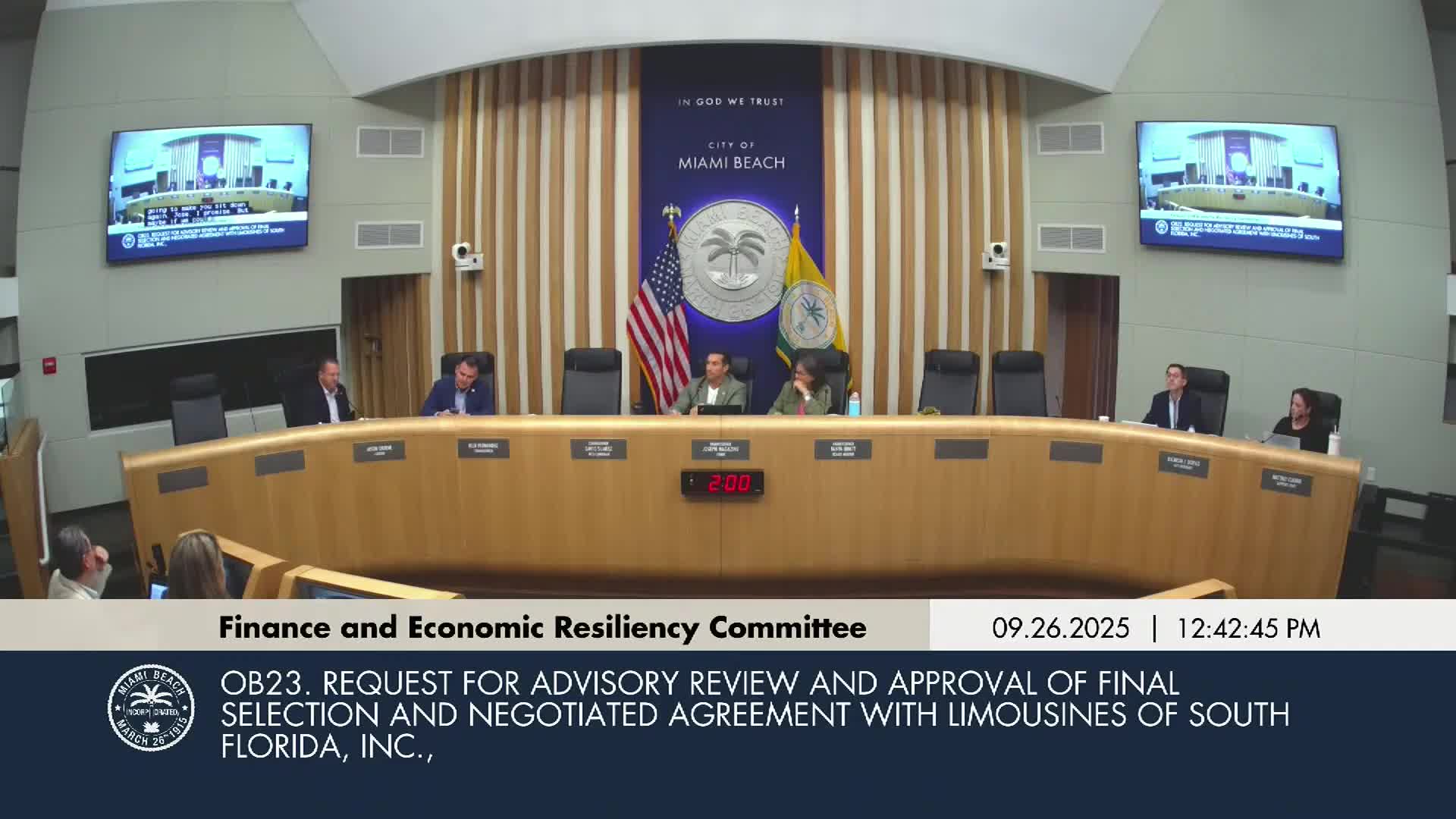Administration recommends Gillig clean‑diesel buses for municipal circulator but committee retains trolley award pending funding plan
September 27, 2025 | Miami Beach, Miami-Dade County, Florida
This article was created by AI summarizing key points discussed. AI makes mistakes, so for full details and context, please refer to the video of the full meeting. Please report any errors so we can fix them. Report an error »

Transportation staff presented procurement results for municipal circulator services and recommended Gillig 40‑foot low‑floor clean‑diesel buses (with a trolley appearance option available at higher cost) as the best operational fit for Miami Beach. The committee did not award the contract; members retained the item for further budget discussions after staff identified a funding gap.
Jose Gonzalez, transportation and mobility director, and consultants reviewed three vehicle types offered by proposers: an authentic vintage‑style trolley (Hometown Trolley), a Gillig vehicle dressed with a trolley package, and a Gillig bus platform. Staff concluded Gillig’s heavy‑duty platform offered superior durability, a proven U.S. supply chain, longer service life, and lower capital and operating costs. Staff presented emissions comparisons showing the Gillig clean‑diesel vehicles reduce greenhouse gas and local pollutant emissions substantially compared with the city’s aging fleet (staff cited roughly a 32% reduction in annual greenhouse gas emissions, a 91% reduction in NOx and an 85% reduction in particulate matter compared with the existing vehicles).
The committee examined electric vehicles as an option but staff said current electric models cannot operate the city’s 15‑hour service day without mid‑day recharging and that adding EV vehicles would increase contract operating costs materially (staff presented an incremental ~$500,000‑per‑EV annual increase under the mixed‑fleet scenarios). Committee members also pressed staff to maximize advertising revenue from exterior wraps and to benchmark market advertising rates; marketing staff said current revenues are modest and staff will return with a market comparison.
Staff reported an estimated contract cost increase versus the city’s existing contract that creates a projected funding gap (several million dollars over the contract). Committee members asked staff and finance to present a program‑budget plan showing potential revenue sources, route/service tradeoffs and timing; the item was retained for the next committee meeting and will be time‑certain on the FERC agenda to allow final consideration after funding options are developed.
Jose Gonzalez, transportation and mobility director, and consultants reviewed three vehicle types offered by proposers: an authentic vintage‑style trolley (Hometown Trolley), a Gillig vehicle dressed with a trolley package, and a Gillig bus platform. Staff concluded Gillig’s heavy‑duty platform offered superior durability, a proven U.S. supply chain, longer service life, and lower capital and operating costs. Staff presented emissions comparisons showing the Gillig clean‑diesel vehicles reduce greenhouse gas and local pollutant emissions substantially compared with the city’s aging fleet (staff cited roughly a 32% reduction in annual greenhouse gas emissions, a 91% reduction in NOx and an 85% reduction in particulate matter compared with the existing vehicles).
The committee examined electric vehicles as an option but staff said current electric models cannot operate the city’s 15‑hour service day without mid‑day recharging and that adding EV vehicles would increase contract operating costs materially (staff presented an incremental ~$500,000‑per‑EV annual increase under the mixed‑fleet scenarios). Committee members also pressed staff to maximize advertising revenue from exterior wraps and to benchmark market advertising rates; marketing staff said current revenues are modest and staff will return with a market comparison.
Staff reported an estimated contract cost increase versus the city’s existing contract that creates a projected funding gap (several million dollars over the contract). Committee members asked staff and finance to present a program‑budget plan showing potential revenue sources, route/service tradeoffs and timing; the item was retained for the next committee meeting and will be time‑certain on the FERC agenda to allow final consideration after funding options are developed.
View full meeting
This article is based on a recent meeting—watch the full video and explore the complete transcript for deeper insights into the discussion.
View full meeting